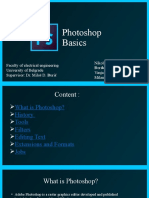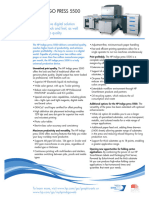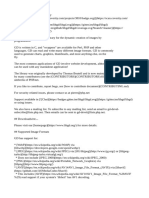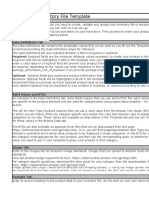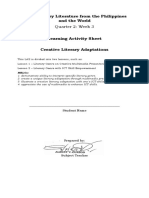IT (9626)
Theory Notes
Different File Types and their Use
Text Files
.DOC (Microsoft Word Document)
A DOC file is a Word processing document created by Microsoft Word, a word processor
included with all versions of Microsoft Office. It may contain formatted text, images, tables,
graphs, charts, page formatting, and print settings.
.DOCX (Microsoft Word Open XML Document)
A DOCX file is a document created by Microsoft Word word processing software. It may contain
text, images, formatting, styles, drawn objects, and other document elements. The document is
used for authoring business, academic, and personal documents and is one of the most popular
word processing document formats. DOCX files can be opened by Word 2007 or later for
Windows, or with Word 2008.
.RTF (Rich Text Format)
An RTF file is a common text file format that supports "rich text." The file includes several types
of text formatting, such as bold type, italics, different fonts and font sizes, and custom tab
settings. It may also support images saved within the text file.
.TXT (Plain Text File)
A TXT file is a standard text document that contains unformatted text. The file is recognized by
any text editing or word processing program and can also be processed by most other software
programs.
Data Files
.CSV (Comma Separated Values File)
A CSV file is a file that contains data sets separated by commas. Each new line in the CSV file
represents a new database row and each database row has one or more fields separated by a
comma. The file can be organized into cells by a spreadsheet program or inserted into a
database.
.PPT (PowerPoint Presentation)
A PPT file is an editable slide show created with Microsoft PowerPoint often used for
presentations or slideshows. It may include formatted text, bullet points, images, movies, sound
� IT (9626)
Theory Notes
effects, and music. The file is commonly built from one of many templates included with the
PowerPoint software, but may also be created from scratch.
Audio Files
.AIF (Audio Interchange File Format)
An AIF file is an audio file created using the Audio Interchange File Format (AIFF). It contains
uncompressed CD‐quality audio similar to a .WAV file and is commonly used to store standard
CD audio. Apple Computer developed the AIFF format.
.MP3 (MP3 Audio File)
An MP3 file is an audio file that uses a compressed audio format developed by the Moving
Picture Experts Group that uses "Layer 3" audio compression. The file is commonly used to store
music files and audiobooks on a hard drive and may provide near‐CD quality sound (stereo, 16‐
bit) in a file roughly 1/10 the size of a .WAV or .AIF file.
.WAV (WAVE Audio File)
A WAV file is an audio file that uses a standard digital audio file format utilized for storing
waveform data. The file allows audio recordings to be saved with different sampling rates
and bitrates. It is often saved in a 44.1 KHz, 16‐bit, stereo format, which is the standard format
used for CD audio.
.WMA (Windows Media Audio File)
A WMA file is an audio file that uses a proprietary format developed by Microsoft similar to
the .MP3 format. It is compressed with Windows Media compression and can be converted to
other more standardized formats. The file is often used for playing music from the Web.
Video Files
.AVI (Audio Video Interleave File)
An AVI file is a video container or wrapper format created by Microsoft. It stores video data that
may be encoded in a variety of codecs and typically uses less compression than similar formats
such as .MPEG and .MOV.
� IT (9626)
Theory Notes
.MP4 (MPEG‐4 Video File)
An MP4 file is a movie or video clip that uses MPEG‐4 compression, a standard developed by the
Moving Picture Experts Group (MPEG). It is commonly used for sharing video files on the
Internet.
.MPG (MPEG Video File)
An MPG file is a common video file that uses a digital video format standardized by the Moving
Picture Experts Group (MPEG). The file is often used for creating movies that are distributed on
the Internet and typically incorporates MPEG‐1 or MPEG‐2 audio and video compression.
.WMV (Windows Media Video File)
A WMV file is a video file based on the Microsoft Advanced Systems Format (ASF) container
format and compressed with Windows Media compression. It contains video encoded with one
of Microsoft's Windows Media Video (WMV) proprietary codecs.
Raster Image Files
.BMP (Bitmap Image File)
A BMP file is an uncompressed raster image comprised of a rectangular grid of pixels. It contains
a file header (bitmap identifier, file size, width, height, color options, and bitmap data starting
point) and bitmap pixels, each with a different color.
.GIF (Graphical Interchange Format File)
A GIF file is an image file often used for web graphics. It may contain up to 256 indexed colors
with a color palette that may be a predefined set of colors or may be adapted to the colors in
the image. The file uses a lossless format, meaning the clarity of the image is not compromised
with GIF compression.
.JPG (JPEG Image)
A JPG file is an image file that uses a compressed image format standardized by the Joint
Photographic Experts Group (JPEG). The file is commonly used for storing digital photos and used
by most digital cameras to save images. The JPG file supports up to 24‐bit color.
� IT (9626)
Theory Notes
.PNG (Portable Network Graphic)
A PNG file is an image file stored in the Portable Network Graphic (PNG) format. It contains a
bitmap of indexed colors and uses lossless compression, similar to a .GIF file but without
copyright limitations. The file is commonly used to store graphics for web images.
.PSD (Adobe Photoshop Document)
A PSD file is an image file created by Adobe Photoshop, a professional image‐editing program. It
may include image layers, adjustment layers, layer masks, annotation notes, file information,
keywords, and other Photoshop‐specific elements.
Vector Image Files
.AI (Adobe Illustrator File)
An AI file is a drawing created with Adobe Illustrator, a vector graphics editing program. It is
composed of paths connected by points, rather than bitmap image data. The file is commonly
used for logos and print media. Since Illustrator image files are saved in a vector format, they
can be enlarged without losing any image quality.
Spreadsheet Files
.XLS (Excel Spreadsheet)
An XLS file is a spreadsheet file created by Microsoft Excel, the most widely‐used spreadsheet
program. It stores data in a table with rows and columns and is often used to create charts and
graphs. The table cells in the file may contain manually entered data or the results computed
from the data of other cells.
.XLSX (Microsoft Excel Open XML Spreadsheet)
An XLSX file is a spreadsheet created with Microsoft Excel, a program used to create
spreadsheets. It stores data in worksheets, which contain cells arranged in a grid of rows and
columns. It may also contain charts, mathematical functions, styles, and formatting. The file is
commonly used to store financial data and to create simple or complex mathematical models.
Database Files
.MDB (Microsoft Access Database)
An MDB file is a database file created by Microsoft Access, a widely‐used desktop relational
database program. It contains the database structure (tables and fields) and database entries
� IT (9626)
Theory Notes
(table rows) as well as data entry forms, queries, stored procedures, reports, and database
security settings.
ACCDB (Access 2007 Database File)
An ACCDB file is a database created with Microsoft Access 2007 or later. It typically contains
data organized into tables and fields. The file may also include custom forms, SQL queries, and
other data. ACCDB files are similar to .MDB files used in previous versions of Access, but support
additional functionality.
Web Files
.HTML (Hypertext Markup Language)
An HTML file is a web page coded in HTML that can be displayed in a web browser. The file is
used to format text, tables, images, and other content that is displayed on the page. Most pages
within static websites have an ".html" extension.
.CSS (Cascading Style Sheet)
A CSS file is a cascading style sheet (CSS) file used to format the contents of a Web page. It
contains customized, global properties for how to display HTML elements. The file can define
the size, color, font, line spacing, indentation, borders, and location of HTML elements.
.JS (Javascript File)
A JS file is a text file containing JavaScript code that is used to execute JavaScript instructions in
Web pages. It may include functions that open and close windows, validate form fields, enable
rollover images, or create drop‐down menus.
Compressed Files
.ZIP (Zipped File)
A ZIP file is a file compressed or "zipped" using Zip compression, which is a common type of
compression in which every file in the archive is compressed separately. The file is supported by
most file compression/decompression programs.
.RAR (WinRAR Compressed Archive)
A RAR file is a file archive that contains one or more files compressed with RAR compression. It
uses a higher compression ratio than typical ZIP compression and incorporates a proprietary
compression algorithm that is now used by other compressors. The RAR file may be extracted
using a variety of programs.








